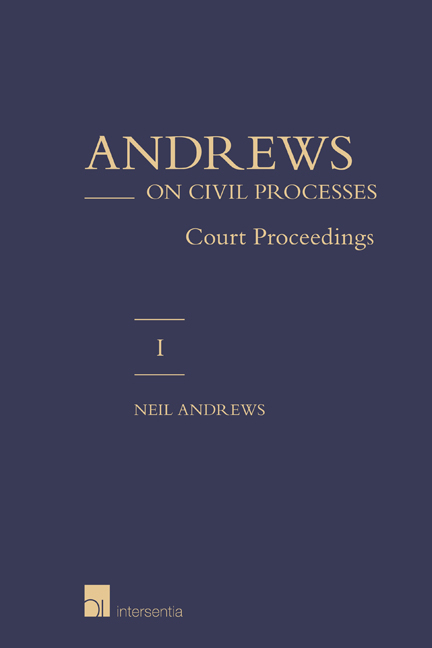Book contents
- Frontmatter
- Dedication
- Epigraph
- Preface
- Contents
- Table of Cases
- Table of Statutes
- Table of Statutory Instruments
- PART I INTRODUCTION TO THE FORMS OF CIVIL JUSTICE
- PART II COMMENCEMENT OF COURT PROCEEDINGS AND PREPARATION FOR TRIAL
- Chapter 4 The Six Phases of Court Proceedings
- Chapter 5 Commencement and Service
- Chapter 6 Pleadings and Parties
- Chapter 7 Counterclaims and Set-Off
- Chapter 8 Limitation of Actions
- Chapter 9 Case Management and Procedural Discipline
- Chapter 10 Pre-Trial Termination of Actions Without Settlement: Interim, Summary, Default, Preliminary and Striking Out Procedures
- Chapter 11 Disclosure
- Chapter 12 Privileges
- Chapter 13 Experts
- PART III END-GAME: TRIAL, APPEAL, FINALITY AND ENFORCEMENT
- PART IV COSTS AND FINANCING OF LITIGATION
- PART V SPECIAL PROCEEDINGS
- PART VI PRINCIPLES OF CIVIL LITIGATION
- PART VII THE EUROPEAN CONTEXT
- Select Bibliography
- Index to Volumes I and II
Chapter 6 - Pleadings and Parties
from PART II - COMMENCEMENT OF COURT PROCEEDINGS AND PREPARATION FOR TRIAL
Published online by Cambridge University Press: 13 December 2017
- Frontmatter
- Dedication
- Epigraph
- Preface
- Contents
- Table of Cases
- Table of Statutes
- Table of Statutory Instruments
- PART I INTRODUCTION TO THE FORMS OF CIVIL JUSTICE
- PART II COMMENCEMENT OF COURT PROCEEDINGS AND PREPARATION FOR TRIAL
- Chapter 4 The Six Phases of Court Proceedings
- Chapter 5 Commencement and Service
- Chapter 6 Pleadings and Parties
- Chapter 7 Counterclaims and Set-Off
- Chapter 8 Limitation of Actions
- Chapter 9 Case Management and Procedural Discipline
- Chapter 10 Pre-Trial Termination of Actions Without Settlement: Interim, Summary, Default, Preliminary and Striking Out Procedures
- Chapter 11 Disclosure
- Chapter 12 Privileges
- Chapter 13 Experts
- PART III END-GAME: TRIAL, APPEAL, FINALITY AND ENFORCEMENT
- PART IV COSTS AND FINANCING OF LITIGATION
- PART V SPECIAL PROCEEDINGS
- PART VI PRINCIPLES OF CIVIL LITIGATION
- PART VII THE EUROPEAN CONTEXT
- Select Bibliography
- Index to Volumes I and II
Summary
INTRODUCTION
The preceding chapter concerned the first two stepping stones for the opening stages of the case: issue of the originating process (a document formerly known, within the pre-CPR High Court practice, as a ‘writ’, but now known, both in the County Courts and in the High Court, as a ‘claim form’); and service of the claim form on the defendant.
The present chapter continues the sequence, examining:
(i) the crafting and delivery of the parties’ main contentions, known now as ‘statements of case’, but historically referred to as ‘pleadings’;
(ii) the process of amending pleadings;
(iii) addition, etc, of parties;
(iv) contribution;
(v) interpleader proceedings.
NATURE AND SIGNIFICANCE OF STATEMENTS OF CASE (‘PLEADINGS’)
The matters in dispute are to be ascertained from the ‘statement of case’, a portmanteau phrase embracing the claim form, particulars of claim (if separate from the claim form), the defence, a possible reply to defence, as well as ‘further information’ (formerly ‘further and better particulars’) and a counterclaim or third party proceeding (now both known as ‘a Part 20 claim’). Even so, the verb ‘plead’, as distinct from the noun ‘pleadings’, is still used. It is also the language used throughout the Common Law world, including the USA.
‘Pleadings’, now known as ‘statements of case’, serve six main functions:
(i) they enable the parties to define the essence of their dispute and so facilitate an orderly process, perhaps culminating in a trial;
(ii) they give each party notice of the relevant issues, thereby preventing surprise or ambush tactics, and also satisfying in part the principle of due notice; Lord Millett suggested that this is the primary function of pleadings;
(iii) clear pleadings can prevent a party from inadvertently making a false admission;
(iv) they set procedural parameters which enable other rules to be applied precisely; they offer guidance as to the scope of ‘relevant’ material which must be disclosed during the disclosure process; this remains important even though the scope of disclosure is now circumscribed by the definition of ‘standard’ disclosure in the CPR; pleadings also determine the scope of any subsequent judgment; the doctrine of res judicata prevents the same matter from being heard twice in separate actions;
- Type
- Chapter
- Information
- Andrews on Civil ProcessesCourt Proceedings, pp. 97 - 124Publisher: IntersentiaPrint publication year: 2013



